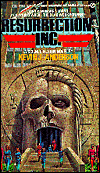 Smittygirl's best friend recommended this book to me, and although it's not normally my genre I always like reading other peoples' favorite books (and I'll lend anybody copies of my favorite books if they want). The book is out of print now but if you click on the cover you'll be taken to BN.com's used book area. At least that's what supposed to happen. Anyway, on to the review!
Smittygirl's best friend recommended this book to me, and although it's not normally my genre I always like reading other peoples' favorite books (and I'll lend anybody copies of my favorite books if they want). The book is out of print now but if you click on the cover you'll be taken to BN.com's used book area. At least that's what supposed to happen. Anyway, on to the review!Having just read Fierce Invalids, I caught something interesting in this book that I might not have picked up on otherwise.
Switters, our fearless hero from Fierce Invalids, has this idea that government and industry combine to keep the great mass of people entertained by meaningless garbage--Jessica Simpson, movie box office totals, the latest tawdry Hollywood affair, sports stars using steroids, even politics presented purely as a horse race--because it keeps them from getting curious about anything else, keeps them too happily occupied to ask questions about what the government or corporations are doing. Thus they can do what they want without much inquiry from thinking people.
The antihero of Resurrection, Inc., Francois Nathans, believes he is setting humanity free by creating undead Servants to fill menial tasks--and finds out that the majority of people set free in such a manner are bored, incurious about government or industry or, indeed, anything at all. Nathans had hoped they would take up the arts, sciences, anything--give in to natural human curiousity. Instead, they didn't--and Nathans sets out to eliminate them once and for all.
What an interesting perspective. Is Switters right, that without constant entertainment people would actually ask questions about the world around them? I like to think he is--curiosity and a desire to learn are hallmarks of humanity. But what if Kevin Anderson, the author of Resurrection, Inc., is right? What if, deprived not only of constant entertainment but of menial work, many people would just sit bored, turn to crime or riots not out of a need to support themselves but simply because they can't think of anything else to do?
One of the books on my reading list is Down and Out in the Magic Kingdom, one of many futurist books set in a post-scarcity world, where the only things that are hard to come by are good seats in restaurants and short lines at theme parks. Post-scarcity worlds have been treated before by science fiction writers (see the Culture cycle by Iain Banks, the Queendom of Sol by Wil McCarthy, and E.M. Forster's The Machine Stops or Arthur C. Clarke's The City and the Stars, though I haven't read any of these; even The Matrix is a sort of post-scarcity society, at least for the machines that control the place), and occasionally there are looks at the world as it struggles to get to that post-scarcity plain. The Diamond Age by Neal Stephenson shows a society approaching post-scarcity. And Resurrection, Inc. shows one man's attempt to push society in that direction.
Writers are divided on whether post-scarcity is good or not (in Riders of the Purple Wage, Philip Jose Farmer notes that artists, though they are the toast of society, often run out of inspiration for their art because the society is free of conflict). Francois Nathans seems to have believed it would be great. Though his Servant revolution (Servants are recently deceased people who's bodies are preserved and implanted with microprocessors and synthetic fluids to allow to function as androids would--except androids are prohibitively expensive and there's an endless supply of the dead) would not have ushered in true post-scarcity economics, he did create the means for vast improvements in efficiency in most industries and commerce, meaning many people lost their jobs but were supported by bouyant governments and welfare (presumably in turn supported by immensely more profitable industry). Nathans and his company (Resurrection, Inc., of course) might have started the machinery of the post-scarcity age to come.
But what happens when nothing is scarce and thus no one needs to work? In Resurrection, Inc., we see that a lot of people don't even bother to get up in the morning. A version of online gaming (the book was written in 1988 so MUDs existed at the time, but Anderson still made a good guess at where multiplayer online games were headed) occupies many people, and others simply sit around, bored, start riots, or turn to petty crime. In the world of Resurrection, Inc., scarcity matters--without it, people's live become meaningless.
I suppose this is the danger of defining yourself through your work--when you have no work, you have no self-definition, either. Though I doubt that was Anderson's goal in telling this story.
Indeed, this is a pretty ripping yarn all the way through, and I haven't even mentioned any of the main plot points. Bear in mind I referred to Francois Nathans as the antihero--because he's certainly no hero. After all, as wonderful as Servants may be, even if the people they freed from work found constructive things to do, everything wouldn't be quite hunky-dory, now would it? What if, through a quirk of the resurrection process, some Servants retained the memories of their previous life... and death?
Oh what a tangled web we weave.
Good book. You'll probably find it a well-stocked local library.
No comments:
Post a Comment